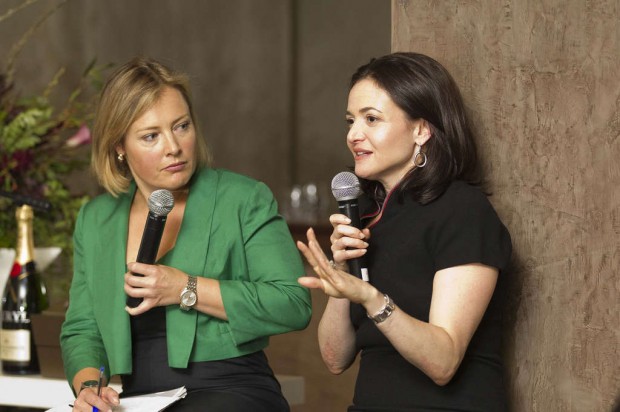By Kait Morris
Sheryl Sandberg’s Ban Bossy campaign continues to gain public support.
The campaign is being run by Sandberg, Facebook’s chief operations officer, and her non-profit Lean In organization in cooperation with the Girl Scouts of the USA.
Ban Bossy launched last Friday and looks to ban the use of the word “bossy” when used to describe women, in order to promote leadership qualities in young women.
The campaign spearheaded by Sandberg has recruited pop culture heavy weights like Beyoncé, Victoria Beckham and Jennifer Garner.
Others, like U.S. Secretary of Education Arne Duncan and former Secretary of State Condoleeza Rice, are also throwing their support behind the campaign.
#banbossy Encourage girls to lead. Join me today: http://t.co/sEkVUpD0B1 x vb pic.twitter.com/sa4ZmjDIh5
— Victoria Beckham (@victoriabeckham) March 10, 2014
Canadian publications are also showing their support for the initiative:
Enough is enough, it’s time to stop calling girls bossy! Find out why we support the #banbossy campaign. http://t.co/11ziIXFx5R — Canadian Living (@canadianliving) March 11, 2014
We pledge to #banbossy. Join @LeanInOrg & @GirlScouts to encourage girls to lead: http://t.co/vcE8TOnE5j @sherylsandberg @MaRSDD
— GirlsinTech Toronto (@GITdot) March 10, 2014
According to campaign information, women make up only 19 per cent of the U.S. congress, 17 per cent of corporate boardrooms, and 5 per cent of Fortune 1,000 CEOs.
The literature also says that by middle school, girls are 25 per cent less likely than boys to say they like taking the lead.
All the stats in the Ban Bossy literature apply to the U.S., but according to a Statistics Canada report from 2011 called Women in Canada, there is still a disparity in income between men and women as recently as 2009.
Sabrina Di Marco, adjunct professor at Humber Business School’s Global Management program and external evaluator for the Canadian International Development Agency says that this campaign is a great way to bring a greater discussion to the table.
“I think what’s important is recognizing the point, not just the word. It’s important for us to nurture our young women and girls to take a leadership role in their own lives and to take leadership roles in their communities,” said Di Marco.
Terry Lynn Potvin, currently the business manager of Hopper Buick GMC in North Bay, Ont., runs her own division called Fresh Start Autos. With 16 years in the automotive industry, she says that the campaign is a great idea.
“Bossy is a more favourable adjective than the other,” she laughs when asked about the initiative. She says she completely agrees with its message and says it needs to start early.
She’s not the only one to have noticed that bossy is used in place of less savoury terms:
The “other B-word” needs to be banned. @sherylsandberg and I explain why society needs to #banbossy via @wsj http://t.co/n195uss3kP
— Anna M. Chávez (@AnnaMariaChavez) March 9, 2014
There are distinct challenges to being a woman in business, particularly in certain industries.
“Every dealership I’ve worked at, it’s occurred,” Potvin explained. “There are lots of Type A personalities working in the industry.”
Some men don’t appreciate having a woman in a leadership role above them, she added.
Potvin explained that she dealt with it by identifying the issue, doing her job right and working to sort out the problem. She says eventually those men who initially didn’t support her in a position of power came to see her for the work she did, not her gender.
Women face the challenge of being labeled bossy and having that perception all the time.
“Everyday, form back then to now and probably tomorrow too,” said Di Marco.
The Ban Bossy campaign has provoked different reactions. Some agencies and individuals wholeheartedly support the initiative. Others have disagreed.
There has been a public outpour of support from many famous personalities, seen in this Lean In public service announcement for Lifetime:
[youtube id=”6dynbzMlCcw” width=”620″ height=”360″]
The Ban Bossy website provides literature for girls, teachers, troop leaders and managers with different advice to help promote women’s leadership in whatever capacity fits.
On the site, leadership tips for managers include tips for navigating something called the “likeability penalty”, which is explained as “when a woman exhibits leadership skills, such as speaking in a direct style or promoting her ideas, she is often liked less by her peers. If she is friendly and helpful, her peers tend to like her but may be less apt to see her as competent.”
The solution? According to the literature, employers should look out for the language. Words like “aggressive” and “too ambitious” can help point out the difference between a legitimate issue and gender bias.
Banning the word might make a difference, said Di Marco.
“I think language is an important tool. The feminists of the 1970s fought for many of the freedoms we enjoy today. Now I’m seeing a backlash in the way of gender bias language,” she said. In saying that colloquialisms like “man” refer to both men and women its just “a hop, skip and a jump from saying a mans vote includes his wife,” said Di Marco.
*Feature photo credit Drew Altizer from Financial Times Flickr Creative Commons.

